#Epoch Wines
Explore tagged Tumblr posts
Text
5 Wines to Valentine's Day
The most romantic day of the year is upon us, at least so they say, and nothing will please your sweetheart more this Valentine’s Day than a special bottle of wine that celebrates love and family. Here are six bottles that are sure to please. #Cheers The Veuve Clicquot Champagne House was founded by Phillippe Clicquot-Muiron in 1772. However, the love story that would create one of the most…

View On WordPress
#everyglassisanadventure#wineoftheday#Chappellet Winery#Epoch Estate#Jackson Family Wine#Kendall-Jackson#Veuve Clicquot
0 notes
Text

Taking Steps is Easy, Standing Still is Hard
There is something about the act of closing a calendar year, a task as tiny as it's monumental, like washing the last dish after an hours-long dinner party, except the dinner party lasted 365 days and the dishes include everything from wine glasses to sledgehammers.


Every year is its own puzzle-box of peculiar challenges. We've been doing this for 13 years now, which in cartoonist years feels like both a geological epoch and the blink of an eye and in that time we've experienced global crises like the pandemic, recessions and countless “little problems” that weren't so little then but seem almost insignificant now.


One of the ways we cope with time – with its merciless forward motion, with the absurdity of continuing to draw lines on paper and pretend those lines mean something – is by revisiting our best comic strips from the year.

It’s not just self-congratulation (though we’re not above that) it’s something deeper, a way of reminding ourselves that even in the roughest stretches of the year, we managed to create something that made us laugh, or made someone else laugh, or at least made us feel less alone in the dark.

In this respect, 2024 was a real treasure trove. It was fun. No, scratch that: it was VERY fun.
We went to festivals – glorious, chaotic, overstimulating festivals where the air smells like ink and coffee and ambition. Angoulême was a highlight, of course. But there were other adventures, too: a road trip through Belgium that felt like stepping into the panels of a Franco-Belgian comic, and not one but TWO visits to Vienna, which is somehow both the most elegant city in Europe and the one most likely to inspire surrealist doodles after a few cocktails.

And then there’s Patreon. Oh, Patreon! What a strange and beautiful thing it is to be supported by people who care enough about what you do to give money for it. To those people (you know who you are) we owe not just our gratitude but our ability to keep going, to keep drawing, to keep finding the absurd and funny in the everyday.
Thank you feels not enough, but we mean it with a depth that’s hard to articulate in a medium primarily composed of speech bubbles.

And now here we are, staring down the barrel of 2025. We’re looking forward to it – the new strips we’ll create, the new people we’ll meet, the new places we’ll visit (and the old places we’ll revisit, because let’s be honest, Vienna probably hasn’t seen the last of us). There will be challenges, there always are. But if 2024 taught us anything, it’s that even the hardest years can be fun if you’re willing to see the humor in them.
So here’s to 2025. Let’s draw!

PS: Yes, you might have noticed that the Top 3 is all about aliens. We're surprised as well but – as we've compiled a sophisticated score to evaluate your reactions to each strip – this one is clearly on you.
1K notes
·
View notes
Text



Miss Vampire
Hand runes are black mage only. All battle jobs have similar jewelry by role. Aside from those, this is wearable by all jobs.
Head: Dirndl's Hat - dalamud red / jet black Body: Vampire's Vest - default / jet black Hands (optional): Archmage's Hand Runes - dalamud red / default Legs: Tights of Eternal Passion - wine red / jet black Feet: Best Man's Gaiters - default / wine red
Alt Hands: Archeo Kingdom Armguards of Casting
Earring: Abyssos Earrings of Casting Neck: Abyssos Choker of Casting Wrists: The Emperor's New Bracelet Right Ring: Epochal Ring of Casting Left Ring: Epochal Ring of Casting
Main Hand: Gridarvor - ruby red / ruby red Off Hand: --
Fashion Accessory: -- Minion: -- Mount: -- Location: Faeberry Atelier
Shader: Faeberry Studio
#ffxiv#ffxiv glamour#ffxiv au ra#ffxiv black mage#eorzea collection#valkariel ilmarë#au ra#raen#black mage#all classes#darks/blacks/greys#reds/oranges/browns#uses mogstation items#uses seasonal items#festival glamour#gothic glamour#fantasy glamour
29 notes
·
View notes
Text
scattered scabbers thoughts 🐀
thinking about peter a lot bc i hate when he’s sans personality in fics….the sexy lamp test but with peter and most don’t pass. which is fine, I don’t think a fic about wolfstar or jegulus needs to center peter. but i am tired of him being left out when his angst potential is off the chain. so here is an incoherent ramble about my peter.
first you must consider the james of it all. i don’t think peter cares that james is a bully at all? he likes being on the side of power. i also think he has crazy abandonment issues which manifest as clingy servitude to the most powerful man around. my treacherous eunuch vibes. and with james he is straight up the jealous ex (‘no one else can have you’, if you won’t love me the most, you won’t live to love at all). in ye olden days, he was the kings poison taster, who became a mithridatist and then poisoned the king himself.
in snape’s worst memory, james messes with him to make sirius laugh. before that, peter’s the butt of the joke for the other marauders (don’t be thick, before wormtail wets himself, always trailing after…) peter’s laughing the hardest, but james only cares about sirius. that’s what eats away at him. HE FUCKING HATED SIRIUS I KNOWWWW IT.
i actually like to think that for years peter was intentionally trying to sabotage james’ chances with lily. he wanted that cookie so effing bad. james and lily’s marriage is what finally does peter in. he’s all jolly and clever and smiling at the wedding and when he gets home mascara streaks, full bottle of wine, patsy cline record, hysterical sobbing. he was holding out for….what? james to realize he loved him more than sirius, more than lily? to marry him instead? this fantasy crashing down essentially causes a psychotic break.
wolfstar would never notice this, because they spent six years orbiting each other before finally getting it together, and often forgot about pete if he wasn’t in the room (they did feel bad about it though).
he hates not meaning enough to james. he wants a reaction, he thinks being able to betray means you were once in someone’s confidence. but when it comes down to it, he can’t bear that james know it was him who betrayed them. he plays his former best friends against each other, gets made secret keeper, tells voldemort, and then hides from the fallout until sirius hunts him down. he probably grieved james viciously, but with the tenor of someone whose close friend died of illness— guiltlessly. once he realized how unrequited that love was, he needed to excise him, carve him out as if he were a tumor in peter’s heart. AND SENDING SIRIUS TO JAIL FOR HIS CRIME IS THE BEST OF BOTH WORLDS !!!!
and then IN TERMS OF THE WEASLEY OF IT ALL: i do think he had a deeply inappropriate attachment to percy weasley. there is a lot to explore there. and then going with ron was just an excuse to see harry also yikes (but it’s funny having every man who knew james show up and be like hi harry i was in love with your dad. don’t worry though, im normal about you. except snape who was famously in love with his mom #diversitywin)
i like peter’s animagus and ‘ratness’ as a metaphor for the sickness and rot in the marauders friend group and ultimately wizard society of the epoch. the praying on the weak, turning a blind eye to abuse and discrimination, upholding hegemonic power. just like rats are symbolic of plague, peter is a manifestation of the sins of that culture. he is a symptom.
#this isn’t very canon inspired though. jkr managed to write a boring peter despite his cool symbolism (rat.#strangled by own hand because he showed mercy to harry) and she hates fat people. so i disregard.#he probably wanted to be on a beach in spain sipping a piña colada … begs the question of why he stayed at the burrow.#met james at eleven thought ‘he’s everything i want to be’. slowly realized he couldn’t be like him and decided to orbit him be his#most favorite friend. but that’s sirius. love envy admiration and hate make a poison that eats through his heart#peter pettigrew petty in the name you are a housewife to#me. HES SINGING THE OTHER WOMAN LANA DEL REY HE THINKS HES IN IBSEN’S A DOLL HOUSE ok im done now#a wormtail will turn#not coherent not well written oh no it’s already 2 am
17 notes
·
View notes
Text
The Death Of A Horse
Les Mis Letters reading club explores one chapter of Les Misérables every day. Join us on Discord, Substack - or share your thoughts right here on tumblr - today's tag is #lm 1.3.8
“The dinners are better at Édon’s than at Bombarda’s,” exclaimed Zéphine.
“I prefer Bombarda to Édon,” declared Blachevelle. “There is more luxury. It is more Asiatic. Look at the room downstairs; there are mirrors [<i>glaces</i>] on the walls.”
“I prefer them [<i>glaces</i>, ices] on my plate,” said Favourite.
Blachevelle persisted:—
“Look at the knives. The handles are of silver at Bombarda’s and of bone at Édon’s. Now, silver is more valuable than bone.”
“Except for those who have a silver chin,” observed Tholomyès.
He was looking at the dome of the Invalides, which was visible from Bombarda’s windows.
A pause ensued.
“Tholomyès,” exclaimed Fameuil, “Listolier and I were having a discussion just now.”
“A discussion is a good thing,” replied Tholomyès; “a quarrel is better.”
“We were disputing about philosophy.”
“Well?”
“Which do you prefer, Descartes or Spinoza?”
“Désaugiers,” said Tholomyès.
This decree pronounced, he took a drink, and went on:—
“I consent to live. All is not at an end on earth since we can still talk nonsense. For that I return thanks to the immortal gods. We lie. One lies, but one laughs. One affirms, but one doubts. The unexpected bursts forth from the syllogism. That is fine. There are still human beings here below who know how to open and close the surprise box of the paradox merrily. This, ladies, which you are drinking with so tranquil an air is Madeira wine, you must know, from the vineyard of Coural das Freiras, which is three hundred and seventeen fathoms above the level of the sea. Attention while you drink! three hundred and seventeen fathoms! and Monsieur Bombarda, the magnificent eating-house keeper, gives you those three hundred and seventeen fathoms for four francs and fifty centimes.”
Again Fameuil interrupted him:—
“Tholomyès, your opinions fix the law. Who is your favorite author?”
“Ber—”
“Quin?”
“No; Choux.”
And Tholomyès continued:—
“Honor to Bombarda! He would equal Munophis of Elephanta if he could but get me an Indian dancing-girl, and Thygelion of Chæronea if he could bring me a Greek courtesan; for, oh, ladies! there were Bombardas in Greece and in Egypt. Apuleius tells us of them. Alas! always the same, and nothing new; nothing more unpublished by the creator in creation! <i>Nil sub sole novum</i>, says Solomon; <i>amor omnibus idem</i>, says Virgil; and Carabine mounts with Carabin into the bark at Saint-Cloud, as Aspasia embarked with Pericles upon the fleet at Samos. One last word. Do you know what Aspasia was, ladies? Although she lived at an epoch when women had, as yet, no soul, she was a soul; a soul of a rosy and purple hue, more ardent hued than fire, fresher than the dawn. Aspasia was a creature in whom two extremes of womanhood met; she was the goddess prostitute; Socrates plus Manon Lescaut. Aspasia was created in case a mistress should be needed for Prometheus.”
Tholomyès, once started, would have found some difficulty in stopping, had not a horse fallen down upon the quay just at that moment. The shock caused the cart and the orator to come to a dead halt. It was a Beauceron mare, old and thin, and one fit for the knacker, which was dragging a very heavy cart. On arriving in front of Bombarda’s, the worn-out, exhausted beast had refused to proceed any further. This incident attracted a crowd. Hardly had the cursing and indignant carter had time to utter with proper energy the sacramental word, <i>Mâtin</i> (the jade), backed up with a pitiless cut of the whip, when the jade fell, never to rise again. On hearing the hubbub made by the passers-by, Tholomyès’ merry auditors turned their heads, and Tholomyès took advantage of the opportunity to bring his allocution to a close with this melancholy strophe:—
“Elle était de ce monde ou coucous et carrosses
Ont le même destin;
Et, rosse, elle a vécu ce que vivant les rosses,
L’espace d’un mâtin!”
“Poor horse!” sighed Fantine.
And Dahlia exclaimed:—
“There is Fantine on the point of crying over horses. How can one be such a pitiful fool as that!”
At that moment Favourite, folding her arms and throwing her head back, looked resolutely at Tholomyès and said:—
“Come, now! the surprise?”
“Exactly. The moment has arrived,” replied Tholomyès. “Gentlemen, the hour for giving these ladies a surprise has struck. Wait for us a moment, ladies.”
“It begins with a kiss,” said Blachevelle.
“On the brow,” added Tholomyès.
Each gravely bestowed a kiss on his mistress’s brow; then all four filed out through the door, with their fingers on their lips.
Favourite clapped her hands on their departure.
“It is beginning to be amusing already,” said she.
“Don’t be too long,” murmured Fantine; “we are waiting for you.”
7 notes
·
View notes
Text
History of Corinthe from its Foundation, part 1
THE Parisians who nowadays on entering on the Rue Rambuteau at the end near the Halles, notice on their right, opposite the Rue Mondétour, a basket-maker's shop having for its sign a basket in the form of Napoleon the Great with this inscription:
NAPOLEON IS MADE
WHOLLY OF WILLOW,
have no suspicion of the terrible scenes which this very spot witnessed hardly thirty years ago.

It was there that lay the Rue de la Chanvrerie, which ancient deeds spell Chanverrerie, and the celebrated public-house called Corinthe.
The reader will remember all that has been said about the barricade effected at this point, and eclipsed, by the way, by the barricade Saint-Merry. It was on this famous barricade of the Rue de la Chanvrerie, now fallen into profound obscurity, that we are about to shed a little light.
May we be permitted to recur, for the sake of clearness in the recital, to the simple means which we have already employed in the case of Waterloo. Persons who wish to picture to themselves in a tolerably exact manner the constitution of the houses which stood at that epoch near the Pointe Saint-Eustache, at the northeast angle of the Halles of Paris, where to-day lies the embouchure of the Rue Rambuteau, have only to imagine an N touching the Rue Saint-Denis with its summit and the Halles with its base, and whose two vertical bars should form the Rue de la Grande-Truanderie, and the Rue de la Chanvrerie, and whose transverse bar should be formed by the Rue de la Petite-Truanderie. The old Rue Mondétour cut the three strokes of the N at the most crooked angles. So that the labyrinthine confusion of these four streets sufficed to form, on a space three fathoms square, between the Halles and the Rue Saint-Denis on the one hand, and between the Rue du Cygne and the Rue des Prêcheurs on the other, seven islands of houses, oddly cut up, of varying sizes, placed crosswise and hap-hazard, and barely separated, like the blocks of stone in a dock, by narrow crannies.

We say narrow crannies, and we can give no more just idea of those dark, contracted, many-angled alleys, lined with eight-story buildings.

These buildings were so decrepit that, in the Rue de la Chanvrerie and the Rue de la Petite-Truanderie, the fronts were shored up with beams running from one house to another.

The street was narrow and the gutter broad, the pedestrian there walked on a pavement that was always wet, skirting little stalls resembling cellars, big posts encircled with iron hoops, excessive heaps of refuse, and gates armed with enormous, century-old gratings. The Rue Rambuteau has devastated all that.
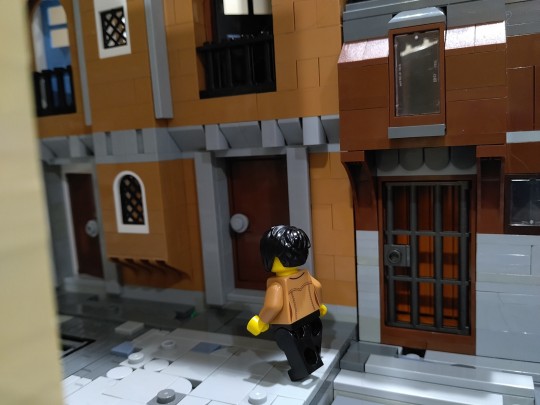
[...] The passer-by who got entangled from the Rue Saint-Denis in the Rue de la Chanvrerie beheld it gradually close in before him as though he had entered an elongated funnel.
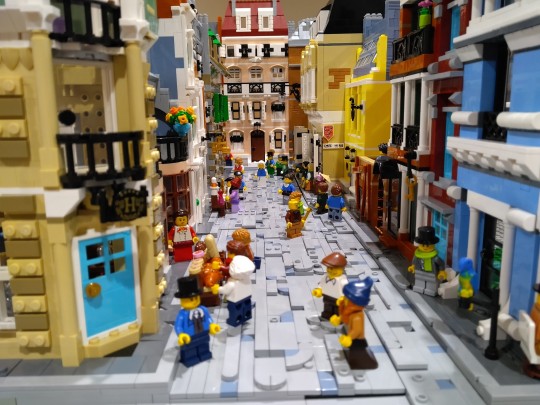
At the end of this street, which was very short, he found further passage barred in the direction of the Halles by a tall row of houses, and he would have thought himself in a blind alley, had he not perceived on the right and left two dark cuts through which he could make his escape. This was the Rue Mondétour, which on one side ran into the Rue de Prêcheurs, and on the other into the Rue du Cygne and the Petite-Truanderie. At the bottom of this sort of cul-de-sac, at the angle of the cutting on the right, there was to be seen a house which was not so tall as the rest, and which formed a sort of cape in the street. It is in this house, of two stories only, that an illustrious wine-shop had been merrily installed three hundred years before.

In the time of Mathurin Regnier, this cabaret was called the Pot-aux-Roses, and as the rebus was then in fashion, it had for its sign-board, a post (poteau) painted rose-color. In the last century, the worthy Natoire, one of the fantastic masters nowadays despised by the stiff school, having got drunk many times in this wine-shop at the very table where Regnier had drunk his fill, had painted, by way of gratitude, a bunch of Corinth grapes on the pink post. The keeper of the cabaret, in his joy, had changed his device and had caused to be placed in gilt letters beneath the bunch these words: "At the Bunch of Corinth Grapes (Au Raisin de Corinthe"). Hence the name of Corinthe. Nothing is more natural to drunken men than ellipses. The ellipsis is the zig-zag of the phrase. Corinthe gradually dethroned the Pot-aux-Roses. The last proprietor of the dynasty, Father Hucheloup, no longer acquainted even with the tradition, had the post painted blue.
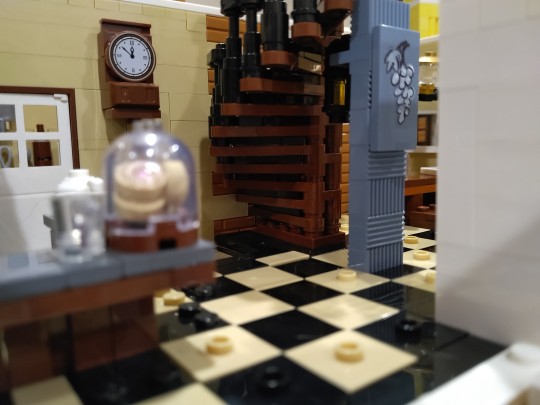
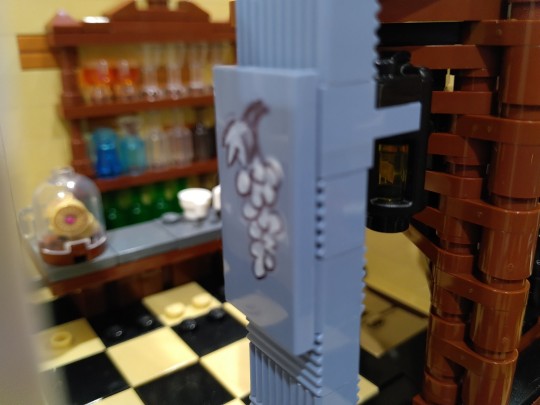
43 notes
·
View notes
Text
I'm not seeing enough deep-dive nonsense about the new Good Omens season 2 poster drop on my dash, and by god that means I must be the one to deliver it.
For those who haven't seen it yet, behold:

...there's a lot in here to go a wee bit feral over, if one was so inclined, and lord knows I love an inclination.
The Obvious Stuff
1. There Was Only One Bed Chair
This is the bulk of the commentary I've seen, and tbh, it's pretty great. "I am bored/busy and ignoring you but also what is personal space, never heard of her, we will not be taking questions at this time."
Notably, however, this is the second time we've seen them back to back-- the majority of the poster art we saw for the first season had them side by side. In both cases they're in a position to face some third thing together-- the difference, perhaps, is that side by side might imply equality of situation, while back to back implies implicit trust that the other won't stab you there.
2. The bookshop
Aw, look at them. Look at it. What a glorious little mess. This is them in London. Arizaphale looks pleased with the situation; Crowley looks bored af but he's also squished up on that one dang chair, so there's a "cat sitting next to you because parallel play and mirroring are the Best Interactions" feel to it.
3. Tea and wine
Arizaphale's got a teacup, Crowley's got a wine glass, this is very Them and indicative of their Vibes. Tbh, I think this is just a nice bit of design work, but it's worth calling out.
4. The outside street
The shop across the way is using a Gothic and reads "GIVE ME" before being cut off. No clue what it means, but it probably means something.
5. The tagline
The previous tagline we got was "Something's going down in the Up" (with that grey feather falling between their black and white wings)-- this tagline reads "Everyday it's a-getting closer."
Easiest interpretation is, oho, we're getting closer to the second season, and gosh there will be some Plot in it. And sure, yes, it works for that too, huzzah. But leaving aside the "it" and what that may mean-- "a-getting" is a fascinating word choice. It evokes similar constructions like, say, the somewhat obscure "Sumer is icumen in" (a song about the changing of the seasons and also encouraging a cuckoo to go lay some eggs in other birds nests if u no wat im sayin eyyyyy)-- and the significantly less obscure protest song "The Times They Are A-Changin'", whose ending stanza is:
The line it is drawn
The curse it is cast
The slow one now
Will later be fast
As the present now
Will later be past
The order is rapidly fadin'
And the first one now
Will later be last
For the times they are a-changin'
Gosh.
Now the Real Fun Starts
This poster is a composite image (as so many ads are), composed of different bits and pieces to form a whole impression -- based on fun stuff like relative pixelation and whatnot, you can often tell what portions of an image were there to start with, and what were specifically added in after the fact. How packed this poster is in tiny details -- which is exactly where I would hide fun hints to things -- is generally a cue for me to take a closer look, and I have been, I think, rewarded.
1. The books with legible titles
Zoom in on Aziraphale's book-- he's reading Charles Dickens's A Tale of Two Cities. The "two cities" in play are Paris and London, and the book is set before and during the French Revolution.
It's the story of a man who had been previously imprisoned in the Bastille for 18 years, and then was released to go live with his daughter -- who he has never met, what with the whole "imprisoned" thing -- in London.
The opening paragraph is:
It was the best of times, it was the worst of times, it was the age of wisdom, it was the age of foolishness, it was the epoch of belief, it was the epoch of incredulity, it was the season of Light, it was the season of Darkness, it was the spring of hope, it was the winter of despair, we had everything before us, we had nothing before us, we were all going direct to Heaven, we were all going direct the other way – in short, the period was so far like the present period, that some of its noisiest authorities insisted on its being received, for good or for evil, in the superlative degree of comparison only.
The pile of books in the foreground have two visible titles: the topmost one is Jane Austen's Pride and Prejudice (a "novel of manners" that's considered a heavy-hitting romantic classic, and also yes the leads are both prideful and prejudiced and it takes an entire book for them to clear that up) and Robert Louis Stevenson's Treasure Island (a young adult coming-of-age adventure story about a kid who finds himself on an adventure with a bunch of pirates to discover buried treasure).
Of note: A Tale of Two Cities, Pride and Prejudice, and Treasure Island also all have note tabs sticking out of them, and are the only books that have them. This is reminiscent of how Arizaphale studied and referenced Agnes Nutter's prophecies.
Some of the books beneath the window technically have titles, but they appear to be about as pixelated as the rest of that section, and so I suspect they're just part of the scenery.
Similarly, most of the books on the background shelves are like that as well, except:
Joseph Heller's Catch-22 (A satirical novel set in World War II; Wikipedia briefly explains that "the novel examines the absurdity of war and military life through the experiences of Yossarian and his cohorts, who attempt to maintain their sanity while fulfilling their service requirements so that they may return home." The book also coined the phrase "catch-22," which is a situation someone can't escape because of paradoxical rules-- in the case of the book, you can't ask to be evaluated for insanity so that you can be exempt from flying dangerous missions, because "anyone who wants to get out of combat duty isn't really crazy.")
Iain Banks's The Crow Road (and a first edition, perhaps? I haven't read it, but apparently it's a Scottish family drama about a perfect murder against the backdrop of the 1990s Gulf War. Its opening line is "It was the day my grandmother exploded." The phrase "the crow road" is a euphemism, in the book, for death.)
Joseph Conrad's Lord Jim (Sparknotes says it's "the story of a man named Marlow's struggle to tell and to understand the life story of a man named Jim" -- a young man who goes to sea, makes a terrible and cowardly decision while following his leaders, and then spends the rest of his life haunted by it.)
There's at least one extra, partially obscured title:
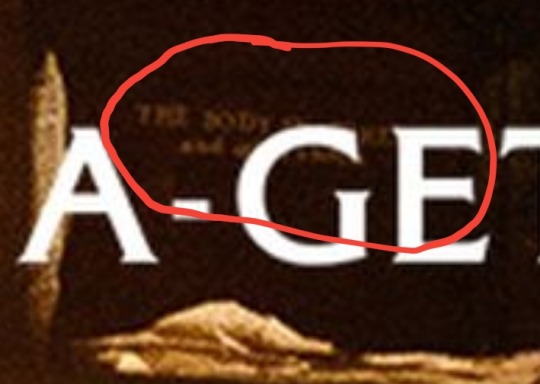
It appears to read "THE BODY ------ and ------", which makes me wonder if it's an anthology of murder mystery short stories.
Leaving aside the uncertain book, commonalities between many of these books include:
soldiers, war, and the horrors/absurdities thereof
doubles and parallels
death and murder
a young/inexperienced protagonist thrown in with more experienced/weirder folk
fragmented and out of order narratives, sometimes having to be pieced together from multiple viewpoints
...pirates
2. The strange but noticeable inserts
There are several images that have been inserted into the poster that -- unlike the teacup and wine glass mentioned above -- don't seem to make a lot of contextual sense and are therefore, perhaps, extra information. These include:
a. the three lizard boys
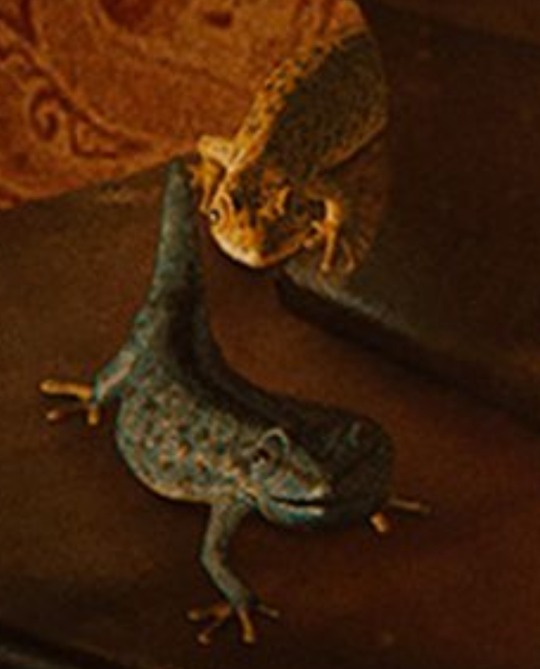
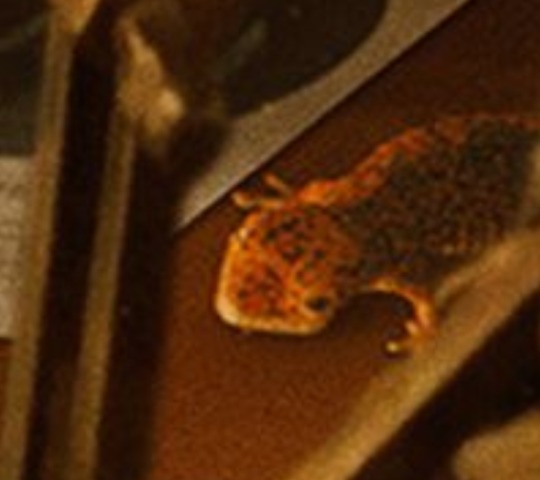
b. the broken smartphone
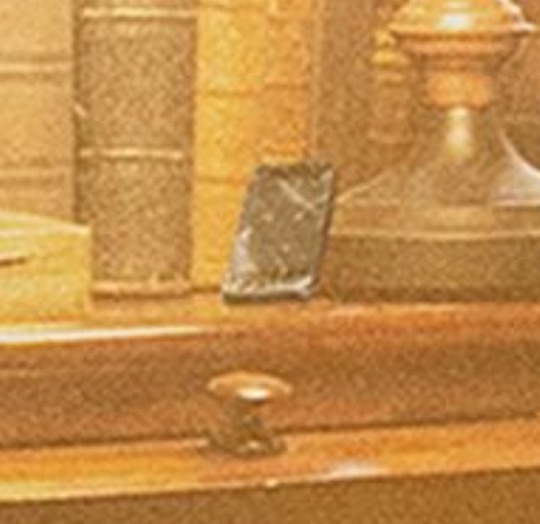
c. the matchbox with the quote on the side
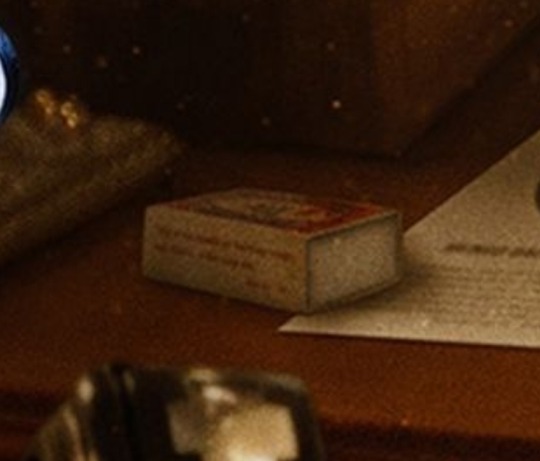
d. the camera
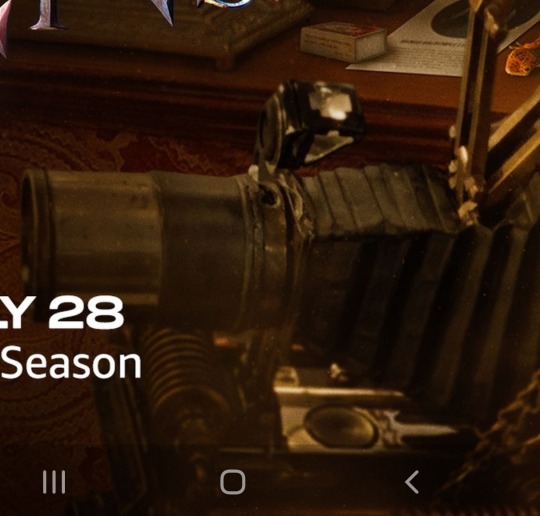
e. this statuette that seems suspicious
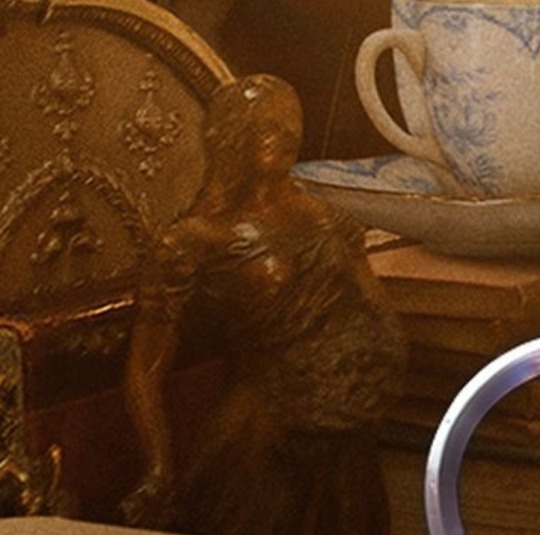
f. this record and scroll that seem out of place
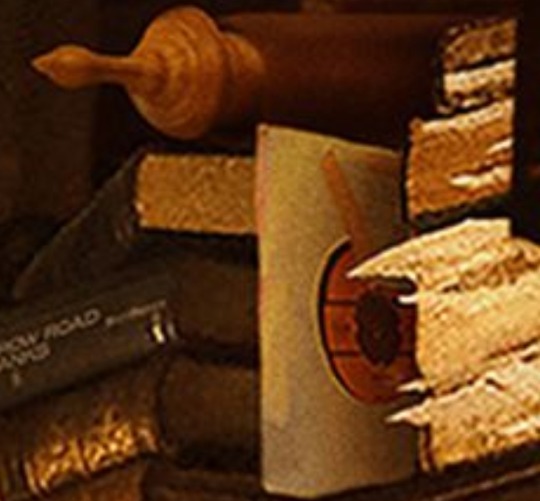
g. the clockface with the missing hand (which may be just for the Aesthetic, but whatever, I'm including it)
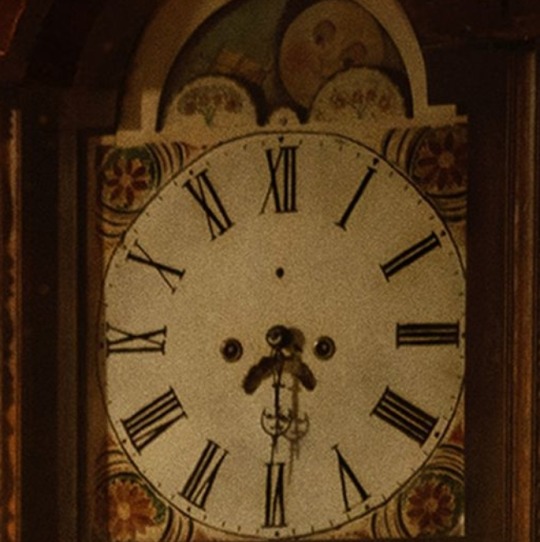
What do they mean? No clue. I suspect it will become apparent as we get trailers and/or the actual show.
In Conclusion
Uh.
Look. Design teams can do all sorts of things for all sorts of reasons. All of this could mean absolutely nothing.
But.
Using my magical powers of bullshit deduction, I might look at all this, and that grey feather falling from the earlier poster, and say... well... the war's still ongoing, yeah? So maybe... maybe there needs to be a new angel keeping an eye on things on Earth. Or an eye specifically on Aziraphale and Crowley.
And that would look SUSPICIOUS, right? So this is an angel who's maybe... a little bit Fallen. For the sake of the Mission. Like, they've agreed to sin just a lil bit, just enough to justify being thrown out of Heaven, and they're not actively in Hell because they're, oh, just stopping off, or maybe just going really slowly, or maybe they were sent back up from Hell because they were still "too good" and all that Pureness of Spirit was stinking up the place--
Whatever. Point is, they're on Earth, they're very confused, it sure would be nice if these very Established metaphysical elders could give them a few hints about how to get on. We'd then get to enjoy a Guide to Living a Totally Normal Human Life given by these two disaster dorks, plus whatever nonsense is derived from, idk, various extraneous plot shenanigans, probably involving a Murder and maybe a MacGuffin Maltese Falcon.
And most importantly: this new angel? Wow no they couldn't possibly be a spy because again WOW, what kind of angel would deliberately Fall? Wouldn't that require doing the wrong thing to do a right thing? ...okay maybe, but can it really be wrong if it was done by command? ...well, wait, it surely must be wrong because otherwise the mechanism wouldn't have worked-- but then, wait, which thing was the wrong thing--
And Aziraphale and Crowley would watch this bouncing volley of cognitive dissonance with great interest, also possibly while holding hands.
150 notes
·
View notes
Text
I love it when you pick up a book and immediately feel this uncanny connection with the author, like you could be great friends. the author may come from a different culture, speak a language you don't know a lick of, and may even be long dead, separated from you by epochs and centuries. yet you just know that you would totally sit together in your kitchen, have a couple bottles of wine, play some music, and giggle, and gossip, and remember the old days, and share your innermost feelings about the human condition. and then the wine would run out, and so would the stories, and you'd just sit there in silence for a while
#if the book is translated you'd actually do all this with the translator#with the author outside in the cold pressing their face against your window#books#booklr#my posts
4 notes
·
View notes
Text
6 Wines to Toast the End of the Year
As we bid adieu to the end of 2023, we raise a glass with a few fun, festive, and delicious wines we enjoyed throughout the year. This year has been filled with wonderful adventures and crazy experiences that we are pleased to say we survived and came out better on the other side. Cheers to you, to drinking the good stuff, and to appreciating the gift that every day is. Bubbles are always an…

View On WordPress
#everyglassisanadventrue#wineoftheday#Bouchaine#Bouchaine Vineyards#Conundrum Wine#enrico serafino#Epoch Winery#Thacher Winery#Tolosa Winery
0 notes
Text
POV: You/Your Tav and your lover are getting ready for a fancy night out, and your lover gets to choose your outfit. What are they putting you/your Tav in?
Thank you for tagging me @sankttealeaf ! <3 I get so excited about this type of thing. (BTW your dresses for Rue are BEAUTIFUL, I love that they change aesthetic depending on who she’s attending with!) Tagging @vestigialpersonality @aurorawintersnight @demong @that-one-dweeb-girl (no obligation, just in case you want to!) and of course @newtia - I know you were tagged, but I can't not tag you anyway :p
My Durge is “Lady” Destri, (f teifling) and Tav(but not really, more of a pre-game OC) is Lilla (f half-elf), who started out tending wine at Gortash’s manor, then was promoted as his personal secretary. All three of them get along very well with one another (Except for that one time Destri lost to her Urge and tried to kill Lilla, but it's been settled since >.>)
While normally Lilla’s attire is buttoned up, bordering on Edwardian gothic, she tries to be conservative, professional, and more understated than the upper classes when attending her master’s events. She’s not intended to be the center of attention, which perfectly suits her (though she does relish being paraded around as his loyal minion, nonetheless).
Her very first day employed as Lord Gortash’s secretary, they attended Lord Honourbough’s soiree. He bid her to wear an emerald dress, as was the theme. After that, emerald was kind of her colour.
It got blood on it though :(
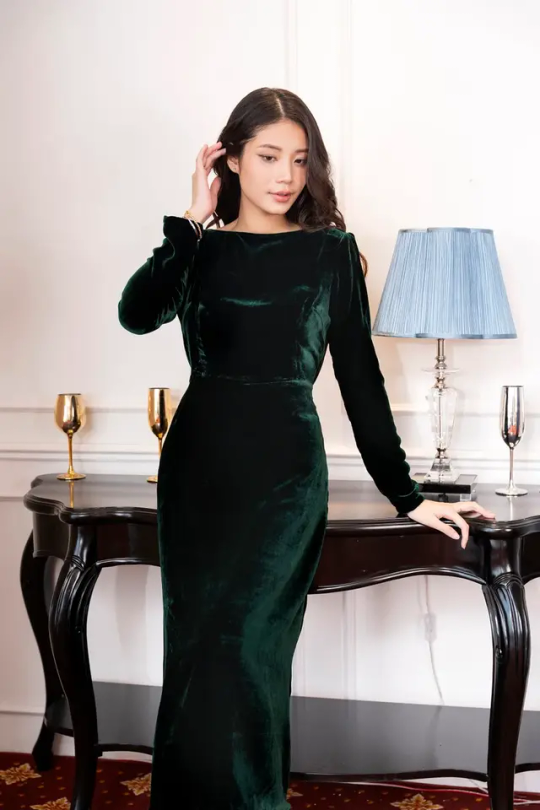


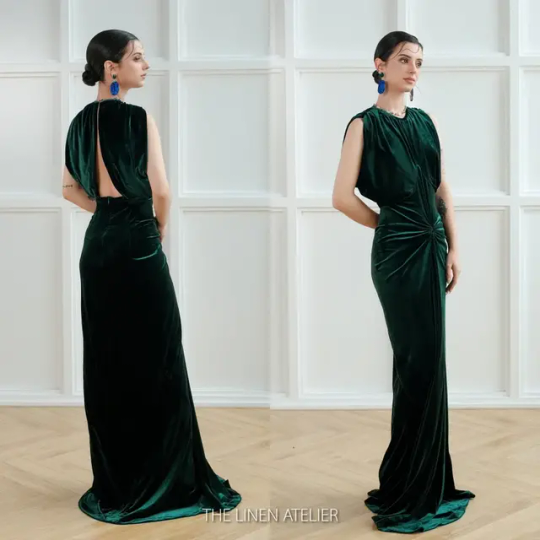
For the more “private” parties (Such as the Crimson Epoch Gala at the Castle Cazador), Gortash commissions more provocative attire for her:


As far as Lady Destri is concerned, she hates clothes, and often stalks naked - but she can easily look the part if she needs to infiltrate a party. Obviously slinky and sexy is the best way to lure whoever she needs into the shadows. She just pokes a hole in the back with her dagger to accommodate her tail, since she usually discards the dresses right afterward anyway.



7 notes
·
View notes
Text

Kertiana was created by the Four Gods, who were later named the Disappeared as they left Kertiana. The names of these Gods are Lit, Anem, Und and Astrap. The heads of the houses of Rocks, Wind, Waves and Lightning are considered descendants of the Gods.
The events of the series of books "Gleams of Aeterna" unfold on the mainland of the Golden Lands, in the largest kingdom of Talig. Once the kingdom was ruled by the Rakans, but for four hundred years the usurpers — the Ollars - have been on the throne.
The need to choose between loyalty to the Rakans and loyalty to the new dynasty still destroys friendships and family ties in Talig. The undercover struggle between supporters and opponents of the Ollars, has repeatedly led to riots throughout the kingdom.
The most prominent place among the nobility of Talig is occupied by four ancient aristocratic houses - the house of Lightning (Épinay), the house of Rocks (Oakdell), the house of Wind (Alva) and the House of Waves (Prydd).

The chronology in Kertiana is conducted from Creation and, for convenience, is divided into alternating 400–year circles (epochs) - Rocks, Wind, Waves and Lightning. It is believed that the change of the circles is accompanied by wars and cataclysms.
The Kertiana's year consists of 16 months of 24 days, each of which is divided into four weeks, coinciding with the lunar phases. The year begins on the Winter Solstice.
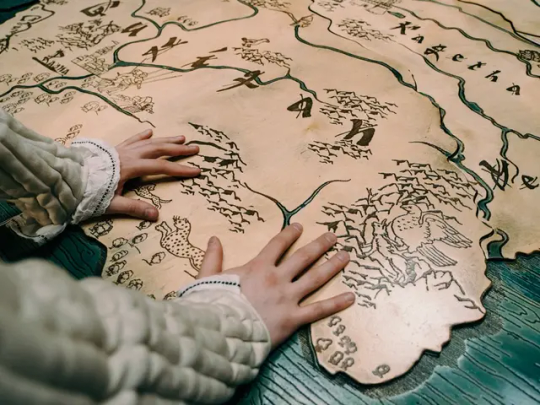
The Golden Lands is one of the continents of Kertiana. The countries Talig, Drieksen, Gayifa, Haunau, Kadana, Aggar and others are located here.
The Kingdom of Talig is divided into regions: province of Épinay, province of Prydda, province of Nador, province of Varasta, Duchy of Neumarinen, Duchy of Canalloa. According to the agreements signed by Francis Ollar and Octavius Ollar - Neumarinen, Canalloa and Marechiara voluntarily joined Talig and have the right to secede from the kingdom at any time. The treaty between Talig and Neumarinen stipulates that in the event of a break in cooperation, the oath given by the subjects of the Duchy of Neumarinen to the King of Talig is also annulled. There is no corresponding article in the treaty between Canalloa and Talig, however, according to Canalloa's traditions, any offense inflicted on Soberano becomes the matter of blood revenge of his subjects.

Wines of Canalloa are considered the best wines on the entire continent. Red wines are called "blood", white wines are called "tears".
"Maiden's tear" is a very dry wine, it has a clear, clean, almost crispy taste (the closest analogue is sauvignon blanc).
"Widow's tear" - it has a very rich bouquet, sometimes too complex (the closest analogue is chardonnay).
"Bad tear" - grapes for this wine aren't just capricious, it's completely unpredictable. The wine master doesn't know what exactly he'll get until the process is completed (the closest analogue is verdelho).
"Black blood" is a mixture of savier lechusa (the closest analogue of Cabernet Sauvignon) and parrise (the closest analogue of shiraz). In the right combination, this wine can be drunk without snacks at all, has a very rich, but also very tough bouquet.
"Dark Blood" is an old, very well-aged savier lechusa (the closest analogue is cabernet sauvignon). This wine has been stored for decades, it has a purple-ruby color. It has a taste of black currant, plum, cherry, vanilla and sometimes cedar or anise.
"Cursed blood" - savier racine (the closest analogue is cabernet merlot) from a seventy-year-old vine. Any surprises can be expected from this wine.
#aeterna#aeterna 2022#fantasy#sorry for any mistakes#there is no official translation#I translate the names to my taste#so they may be different#отблески этерны#этерна
4 notes
·
View notes
Text



Enticing
Head: Far Eastern Beauty's Hairpin - jet black / metallic gold Body: Exarchic Coat of Casting - default Hands: Archmage's Hand Runes - ruby red / default Legs: Tights of Eternal Passion - wine red / jet black Feet: Best Man's Gaiters - default / metallic brass
Earring: The Emperor's New Earrings Neck: The Emperor's New Necklace Wrists: The Emperor's New Bracelet Right Ring: Epochal Ring of Casting Left Ring: Facet Ring of Casting
Main Hand: Dark Horse Champion's Rod - soot black / metallic gold Off Hand: --
Fashion Accessory: Fallen Angel Wings Minion: -- Mount: -- Location: Mt. Gulg - The Whtie Gate
Shader: Faeberry Bloom
#ffxiv#ffxiv glamour#ffxiv au ra#ffxiv black mage#eorzea collection#valkariel ilmarë#au ra#raen#black mage#darks/blacks/greys#golds/yellows#reds/oranges/browns#uses mogstation items#no seasonal items#fantasy glamour
27 notes
·
View notes
Text


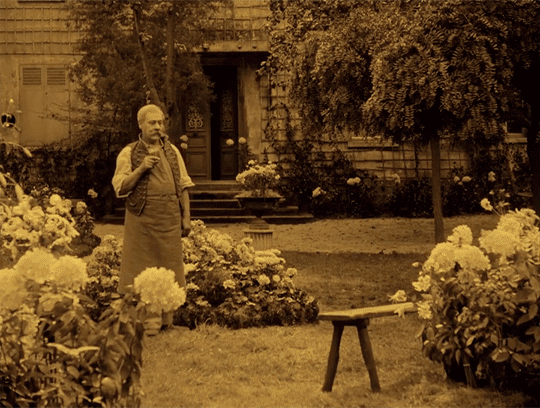

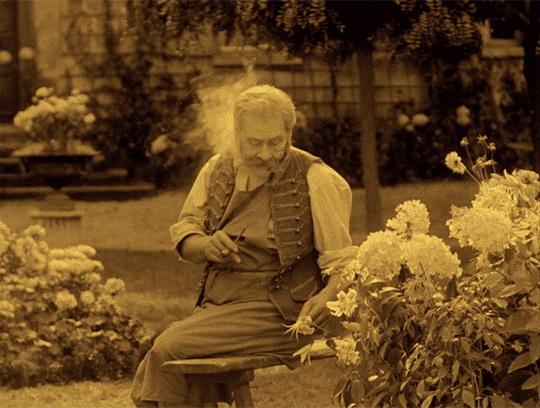
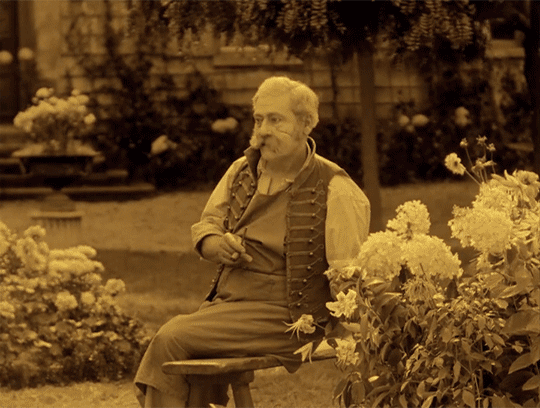
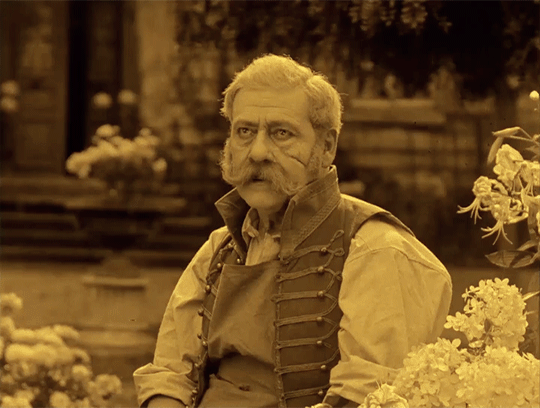
LES MIS LETTERS IN ADAPTATION - One of the Red Spectres of that Epoch, LM 3.3.2 (Les Miserables 1925)
Any one who had chanced to pass through the little town of Vernon at this epoch, and who had happened to walk across that fine monumental bridge, which will soon be succeeded, let us hope, by some hideous iron cable bridge, might have observed, had he dropped his eyes over the parapet, a man about fifty years of age wearing a leather cap, and trousers and a waistcoat of coarse gray cloth, to which something yellow which had been a red ribbon, was sewn, shod with wooden sabots, tanned by the sun, his face nearly black and his hair nearly white, a large scar on his forehead which ran down upon his cheek, bowed, bent, prematurely aged, who walked nearly every day, hoe and sickle in hand, in one of those compartments surrounded by walls which abut on the bridge, and border the left bank of the Seine like a chain of terraces, charming enclosures full of flowers of which one could say, were they much larger: “these are gardens,” and were they a little smaller: “these are bouquets.” All these enclosures abut upon the river at one end, and on a house at the other. The man in the waistcoat and the wooden shoes of whom we have just spoken, inhabited the smallest of these enclosures and the most humble of these houses about 1817. He lived there alone and solitary, silently and poorly, with a woman who was neither young nor old, neither homely nor pretty, neither a peasant nor a bourgeoise, who served him. The plot of earth which he called his garden was celebrated in the town for the beauty of the flowers which he cultivated there. These flowers were his occupation. By dint of labor, of perseverance, of attention, and of buckets of water, he had succeeded in creating after the Creator, and he had invented certain tulips and certain dahlias which seemed to have been forgotten by nature. He was ingenious; he had forestalled Soulange Bodin in the formation of little clumps of earth of heath mould, for the cultivation of rare and precious shrubs from America and China. He was in his alleys from the break of day, in summer, planting, cutting, hoeing, watering, walking amid his flowers with an air of kindness, sadness, and sweetness, sometimes standing motionless and thoughtful for hours, listening to the song of a bird in the trees, the babble of a child in a house, or with his eyes fixed on a drop of dew at the tip of a spear of grass, of which the sun made a carbuncle. His table was very plain, and he drank more milk than wine. A child could make him give way, and his servant scolded him. He was so timid that he seemed shy, he rarely went out, and he saw no one but the poor people who tapped at his pane and his curé, the Abbé Mabeuf, a good old man. Nevertheless, if the inhabitants of the town, or strangers, or any chance comers, curious to see his tulips, rang at his little cottage, he opened his door with a smile. He was the “brigand of the Loire.”
#Les Mis#Les Miserables#Les Mis Letters#Les Mis 1925#Les Miserables 1925#Georges Pontmercy#Les Mis Letters in Adaptation#lesmisedit#lesmiserablesedit#lesmiserables1925edit#silentfilmedit#filmedit#pureanonedits#LM 3.3.2#long post#HE MAKES ME SO SADDDDD#Luc Dartagnan
24 notes
·
View notes
Text
URL Music Game 🎶
Make a playlist with each letter of your URL!
Tagged by @artilaz
M - Mr Blue Sky - Electric Light Orchestra
E - Everybody Knows Shit's Fucked - Stephen Paul Taylor
L - Lilac Wine - Katie Melua
V - Violence - The Unlikely Candidates
I - I Don't Like Myself - girli
N - :)
T - That Bitch - Sizzy Rocket
H - High Frequency - Louis III/Lucas Estrada
E - Elle Me Dit - Mika
D - Dick This Big - Todrick Hall
E - Epoch (The Living Tombstone's Remix) - Savlonic
P - Pink (Freak) - Elliot Lee ft girli
R - Rendezvous - Miss Benny
E - Eros & Apollo - Studio Killers
S - Shipwrecked - Alestorm
S - Sparkle - Ayumi Hamasaki
E - Everyday I Love You Less And Less - Kaiser Chiefs
D - Do It All The Time - I DONT KNOW HOW BUT THEY FOUND ME
R - ruin - The Amazing Devil
O - Old Molly Metcalfe - Jake Thackray
B - Barry & Freda - Victoria Wood
O - OFF MY FACE - Måneskin
T - Top Secret - hANGRY & ANGRY
i'm bad at tagging so I'm just picking a random bunch from my activity tab; @bizzarczar @raptorjesus-mf @bluerose5 @writterings @roastedtomatosoup
5 notes
·
View notes
Text
At Bombarda’s
Les Mis Letters reading club explores one chapter of Les Misérables every day. Join us on Discord, Substack - or share your thoughts right here on tumblr - today's tag is #lm 1.3.5
The Russian mountains having been exhausted, they began to think about dinner; and the radiant party of eight, somewhat weary at last, became stranded in Bombarda’s public house, a branch establishment which had been set up in the Champs-Élysées by that famous restaurant-keeper, Bombarda, whose sign could then be seen in the Rue de Rivoli, near Delorme Alley.
A large but ugly room, with an alcove and a bed at the end (they had been obliged to put up with this accommodation in view of the Sunday crowd); two windows whence they could survey beyond the elms, the quay and the river; a magnificent August sunlight lightly touching the panes; two tables; upon one of them a triumphant mountain of bouquets, mingled with the hats of men and women; at the other the four couples seated round a merry confusion of platters, dishes, glasses, and bottles; jugs of beer mingled with flasks of wine; very little order on the table, some disorder beneath it
“They made beneath the table
A noise, a clatter of the feet that was abominable,”
says Molière.
This was the state which the shepherd idyl, begun at five o’clock in the morning, had reached at half-past four in the afternoon. The sun was setting; their appetites were satisfied.
The Champs-Élysées, filled with sunshine and with people, were nothing but light and dust, the two things of which glory is composed. The horses of Marly, those neighing marbles, were prancing in a cloud of gold. Carriages were going and coming. A squadron of magnificent body-guards, with their clarions at their head, were descending the Avenue de Neuilly; the white flag, showing faintly rosy in the setting sun, floated over the dome of the Tuileries. The Place de la Concorde, which had become the Place Louis XV. once more, was choked with happy promenaders. Many wore the silver fleur-de-lys suspended from the white-watered ribbon, which had not yet wholly disappeared from button-holes in the year 1817. Here and there choruses of little girls threw to the winds, amid the passers-by, who formed into circles and applauded, the then celebrated Bourbon air, which was destined to strike the Hundred Days with lightning, and which had for its refrain:—
“Rendez-nous notre père de Gand,
Rendez-nous notre père.”
“Give us back our father from Ghent,
Give us back our father.”
Groups of dwellers in the suburbs, in Sunday array, sometimes even decorated with the fleur-de-lys, like the bourgeois, scattered over the large square and the Marigny square, were playing at rings and revolving on the wooden horses; others were engaged in drinking; some journeyman printers had on paper caps; their laughter was audible. Everything was radiant. It was a time of undisputed peace and profound royalist security; it was the epoch when a special and private report of Chief of Police Anglès to the King, on the subject of the suburbs of Paris, terminated with these lines:—
“Taking all things into consideration, Sire, there is nothing to be feared from these people. They are as heedless and as indolent as cats. The populace is restless in the provinces; it is not in Paris. These are very pretty men, Sire. It would take all of two of them to make one of your grenadiers. There is nothing to be feared on the part of the populace of Paris the capital. It is remarkable that the stature of this population should have diminished in the last fifty years; and the populace of the suburbs is still more puny than at the time of the Revolution. It is not dangerous. In short, it is an amiable rabble.”
Prefects of the police do not deem it possible that a cat can transform itself into a lion; that does happen, however, and in that lies the miracle wrought by the populace of Paris. Moreover, the cat so despised by Count Anglès possessed the esteem of the republics of old. In their eyes it was liberty incarnate; and as though to serve as pendant to the Minerva Aptera of the Piræus, there stood on the public square in Corinth the colossal bronze figure of a cat. The ingenuous police of the Restoration beheld the populace of Paris in too “rose-colored” a light; it is not so much of “an amiable rabble” as it is thought. The Parisian is to the Frenchman what the Athenian was to the Greek: no one sleeps more soundly than he, no one is more frankly frivolous and lazy than he, no one can better assume the air of forgetfulness; let him not be trusted nevertheless; he is ready for any sort of cool deed; but when there is glory at the end of it, he is worthy of admiration in every sort of fury. Give him a pike, he will produce the 10th of August; give him a gun, you will have Austerlitz. He is Napoleon’s stay and Danton’s resource. Is it a question of country, he enlists; is it a question of liberty, he tears up the pavements. Beware! his hair filled with wrath, is epic; his blouse drapes itself like the folds of a chlamys. Take care! he will make of the first Rue Grenétat which comes to hand Caudine Forks. When the hour strikes, this man of the faubourgs will grow in stature; this little man will arise, and his gaze will be terrible, and his breath will become a tempest, and there will issue forth from that slender chest enough wind to disarrange the folds of the Alps. It is, thanks to the suburban man of Paris, that the Revolution, mixed with arms, conquers Europe. He sings; it is his delight. Proportion his song to his nature, and you will see! As long as he has for refrain nothing but <i>la Carmagnole</i>, he only overthrows Louis XVI.; make him sing the <i>Marseillaise</i>, and he will free the world.
This note jotted down on the margin of Anglès’ report, we will return to our four couples. The dinner, as we have said, was drawing to its close.
7 notes
·
View notes
Text
What Is To Be Done In the Abyss If One Does Not Converse? Part 1
Sixteen years count in the subterranean education of insurrection, and June, 1848, knew a great deal more about it than June, 1832. So the barricade of the Rue de la Chanvrerie was only an outline, and an embryo compared to the two colossal barricades which we have just sketched; but it was formidable for that epoch.
The insurgents under the eye of Enjolras, for Marius no longer looked after anything, had made good use of the night. The barricade had been not only repaired, but augmented. They had raised it two feet. Bars of iron planted in the pavement resembled lances in rest. All sorts of rubbish brought and added from all directions complicated the external confusion. The redoubt had been cleverly made over, into a wall on the inside and a thicket on the outside.
The staircase of paving-stones which permitted one to mount it like the wall of a citadel had been reconstructed.

The barricade had been put in order, the tap-room disencumbered, the kitchen appropriated for the ambulance, the dressing of the wounded completed, the powder scattered on the ground and on the tables had been gathered up, bullets run, cartridges manufactured, lint scraped, the fallen weapons re-distributed, the interior of the redoubt cleaned, the rubbish swept up, corpses removed.

They laid the dead in a heap in the Mondétour lane, of which they were still the masters. The pavement was red for a long time at that spot. Among the dead there were four National Guardsmen of the suburbs. Enjolras had their uniforms laid aside.

Enjolras had advised two hours of sleep. Advice from Enjolras was a command. Still, only three or four took advantage of it.
Feuilly employed these two hours in engraving this inscription on the wall which faced the tavern:—
LONG LIVE THE PEOPLES!
These four words, hollowed out in the rough stone with a nail, could be still read on the wall in 1848.

The three women had profited by the respite of the night to vanish definitely; which allowed the insurgents to breathe more freely.
They had found means of taking refuge in some neighboring house.

The greater part of the wounded were able, and wished, to fight still. On a litter of mattresses and trusses of straw in the kitchen, which had been converted into an ambulance, there were five men gravely wounded, two of whom were municipal guardsmen. The municipal guardsmen were attended to first.

In the tap-room there remained only Mabeuf under his black cloth and Javert bound to his post.
“This is the hall of the dead,” said Enjolras.
In the interior of this hall, barely lighted by a candle at one end, the mortuary table being behind the post like a horizontal bar, a sort of vast, vague cross resulted from Javert erect and Mabeuf lying prone.
The pole of the omnibus, although snapped off by the fusillade, was still sufficiently upright to admit of their fastening the flag to it.
Enjolras, who possessed that quality of a leader, of always doing what he said, attached to this staff the bullet-ridden and bloody coat of the old man’s.

No repast had been possible. There was neither bread nor meat. The fifty men in the barricade had speedily exhausted the scanty provisions of the wine-shop during the sixteen hours which they had passed there. At a given moment, every barricade inevitably becomes the raft of la Méduse. They were obliged to resign themselves to hunger. They had then reached the first hours of that Spartan day of the 6th of June when, in the barricade Saint-Merry, Jeanne, surrounded by the insurgents who demanded bread, replied to all combatants crying: “Something to eat!” with: “Why? It is three o’clock; at four we shall be dead.”
As they could no longer eat, Enjolras forbade them to drink. He interdicted wine, and portioned out the brandy.
They had found in the cellar fifteen full bottles hermetically sealed. Enjolras and Combeferre examined them. Combeferre when he came up again said:—“It’s the old stock of Father Hucheloup, who began business as a grocer.”—“It must be real wine,” observed Bossuet. “It’s lucky that Grantaire is asleep. If he were on foot, there would be a good deal of difficulty in saving those bottles.”

—Enjolras, in spite of all murmurs, placed his veto on the fifteen bottles, and, in order that no one might touch them, he had them placed under the table on which Father Mabeuf was lying.

7 notes
·
View notes